自考英语2第六单元
自考英语二Unit6 TextB the importance of money in life练习
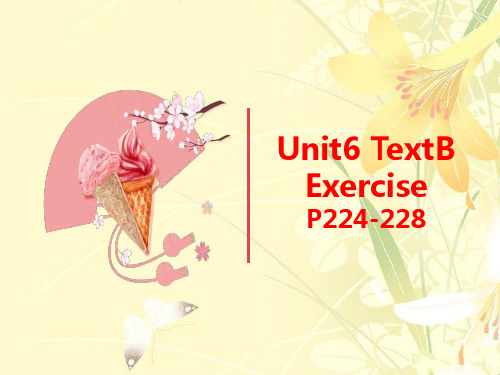
3. The children felt exhausted. They fell asleep at once. The children felt so exhausted that they fell asleep at once. 4. My wife was using the vacuum cleaner. I was trying to listen to a broadcast play.
2. Young children usually have a__fa_v_o_u_r_it_e soft object like a stuffed animal or a blanket. (favourite, favour)
3. Jack wanted to invite the beautiful girl out, but was _s_c_a_r_e_d_ that she would refuse.(scare, scared)
6. The country has been in a very poor _e_c_o_n_o_m_i_c state ever since the decline of its two major industries, (economic, economy)
山东省自考英语二Unit 6

Unit 6(山东省自考英语)Text AThe British Educational System 英国的教育体系All over the world,the mention of English education suggests a picture of“public schools”,and it suggests in particular the names of certain very famous instructions—Eton,Oxford and Cambridge; but People do not always realize what place these institutions occupy in the who1e educational system.一提起英国教育呈现在人们面前的往往是一幅“公学”的画面,特别是一些著名的教育机构——伊顿、牛津、剑桥等;但是人们往往不了解这些机构在英国整个教育体系中所占的位置。
Oxford and Cambridge are universities each haying about 12,000 students out of a total of over 250,000 students at all British universities.牛津和剑桥两所大学分别拥有大约12 000在校生,而全英在校大学生的总数超过250 000。
Eton is a public school,and the best known of the public schools. which,in spite of their name,are not really public at all,but independent and private secondary schools taking boys from the age thirteen to eighteen years.伊顿是所公学,也是最著名的公学, 尽管名字叫公学,其实并不是真正意义上的公立学校,而是所独立的私立中学。
Unit6:thevalueofmoney(自考英语2)解读
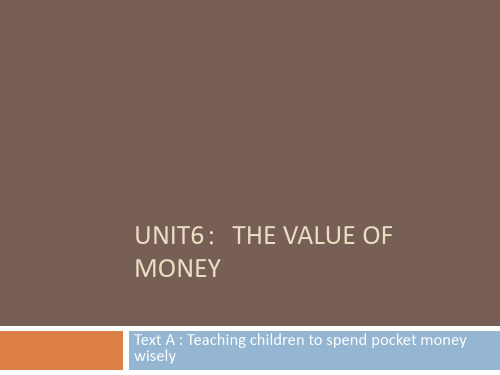
New words
•differentiate v. 区分;区别;辨别 I've learned to differentiate a French wine from a Chinese wine. •Differ vt. 使…相异;使…不同 Each writer's style differs from that of another. Her husband always differs with her. •Different adj. 不同的;个别的,与众不同的 Now it is different from the past. Foreign countries have a different way of life from ours. •Difference n. 差异;不同;争执 There is a world of difference between the two. It's difficult to level down the notable difference Between the two.
New words
• overspend v. 花钱过多;比(预计的)花得多; 超支;注意over- / out-的区别: overeat vt. 使吃过量; vi. 吃得过多 outeat vt. 吃得比…多 overdo vt.把…做得过分 vi. 做得过分;表演过火 Outdo vt. 超过;胜过 oversleep vt. 使睡过头 vi. 睡过头 outlive vt. 比…活得长;比…经久 overweight adj. 超重的;过重的; n. 超重 Outweigh vt. 比…重(在重量上);比…重要; 比…有价值
New words
自考英语二-unit-6-语法

New words
differentiate
vt.& vi. 区分,区别,辨别 A child may not differentiate between his imagination and the real world... 儿童可能无法将自己的幻想与真实世界区分开来。 It's difficult to differentiate between the two varieties. 这两个品种很难辨别。 He never learned to differentiate between good and evil. 他从未学会分辨善恶。 He couldn't differentiate between the enemy and ourselves. 他敌我不分。
New words
result in
引起,导致,以…为结局;落得;致使 The game resulted in another victory for our team. 比赛结果, 我们队又获胜了。 Excessive dosage of this drug can result in injury to the liver. 这种药使用过量会 损害肝脏。 Compulsion will never result in convincing them. 强迫永远不会使他们信服。 Complacency could easily result in tragedy. 自满容易道致悲剧。
Sentence patterns:
2. S+ V + it +
… a rule
one’s duty + ( for sb. ) to do sth. /clause an honour
自考英语二 unit 6

* She shaded her eyes (from the sun) with her hand. 她把 手放在眼睛上方挡住阳光
Text A
• defective adj. a ~ car 有缺陷的车子 He is ~ in humor. 他缺乏幽默
•
8、业余生活要有意义,不要越轨。20 20年12 月13日 星期日 2时27 分59秒0 2:27:59 13 December 2020
特定的; 具体的; specific instructions 明确的指示 for a ~ purpose为某特定的目的 with no ~ aim 没有明确目的[目标]地
Text A
• shade • n. 荫; 阴凉处;遮光物;
* sit in the shade of a tree, wall, etc 坐在树﹑ 墙等的阴凉处 * The trees give some welcome shade from the sun. 这些树
• prevalent adj. ~ (among/in sth/sb) That superstition was ~ among them. 那种迷信在他们之间广为流传
• n. prevalence
Text A
• automatic adj. (指机器)自动的; (指动作)未 加思索而做出的(尤指基於习惯或因袭陈规者); 无意识的 an automatic washing-machine 自动洗衣机 For most of us breathing is automatic. 我们大多 数人的呼吸都是无意识的
• automotive adj. 自动推进的; 汽车的 the automotive industry
国考自考英语二Unit 6 参考译文
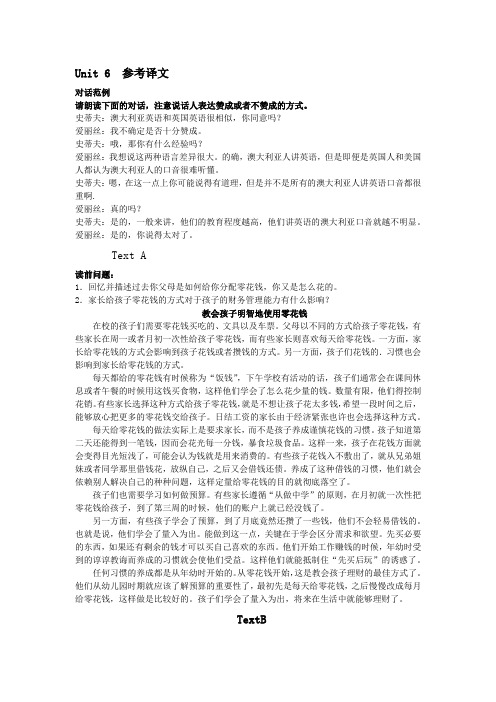
Unit 6 参考译文对话范例请朗读下面的对话,注意说话人表达赞成或者不赞成的方式。
史蒂夫:澳大利亚英语和英国英语很相似,你同意吗?爱丽丝:我不确定是否十分赞成。
史蒂夫:哦,那你有什么经验吗?爱丽丝:我想说这两种语言差异很大。
的确,澳大利亚人讲英语,但是即便是英国人和美国人都认为澳大利亚人的口音很难听懂。
史蒂夫:嗯,在这一点上你可能说得有道理,但是并不是所有的澳大利亚人讲英语口音都很重啊.爱丽丝:真的吗?史蒂夫:是的,一般来讲,他们的教育程度越高,他们讲英语的澳大利亚口音就越不明显。
爱丽丝:是的,你说得太对了。
Text A读前问题:1.回忆并描述过去你父母是如何给你分配零花钱,你又是怎么花的。
2.家长给孩子零花钱的方式对于孩子的财务管理能力有什么影响?教会孩子明智地使用零花钱在校的孩子们需要零花钱买吃的、文具以及车票。
父母以不同的方式给孩子零花钱,有些家长在周一或者月初一次性给孩子零花钱,而有些家长则喜欢每天给零花钱。
一方面,家长给零花钱的方式会影响到孩子花钱或者攒钱的方式。
另一方面,孩子们花钱的.习惯也会影响到家长给零花钱的方式。
每天都给的零花钱有时候称为“饭钱”,下午学校有活动的话,孩子们通常会在课间休息或者午餐的时候用这钱买食物,这样他们学会了怎么花少量的钱。
数量有限,他们得控制花销。
有些家长选择这种方式给孩子零花钱,就是不想让孩子花太多钱,希望一段时间之后,能够放心把更多的零花钱交给孩子。
日结工资的家长由于经济紧张也许也会选择这种方式。
每天给零花钱的做法实际上是要求家长,而不是孩子养成谨慎花钱的习惯。
孩子知道第二天还能得到一笔钱,因而会花光每一分钱,暴食垃圾食品。
这样一来,孩子在花钱方面就会变得目光短浅了,可能会认为钱就是用来消费的。
有些孩子花钱入不敷出了,就从兄弟姐妹或者同学那里借钱花,放纵自己,之后又会借钱还债。
养成了这种借钱的习惯,他们就会依赖别人解决自己的种种问题,这样定量给零花钱的目的就彻底落空了。
(完整版)自考英语二(新版)原文Unit6TheValueofMoney
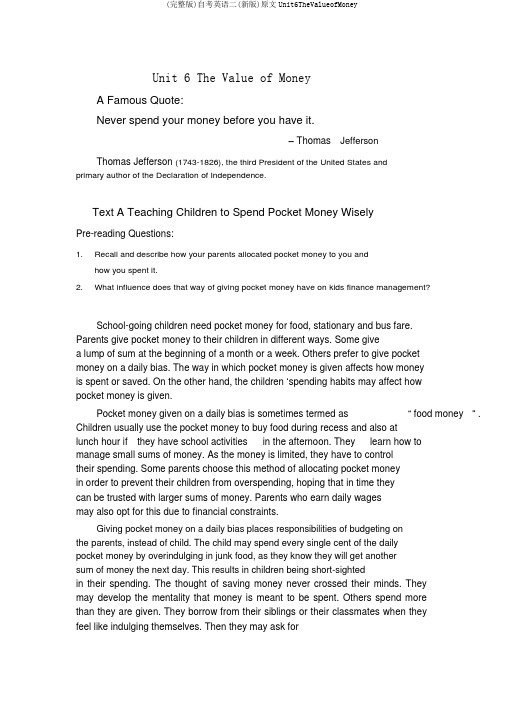
Unit 6 The Value of MoneyA Famous Quote:Never spend your money before you have it.–Thomas JeffersonThomas Jefferson (1743-1826), the third President of the United States andprimary author of the Declaration of Independence.Text A Teaching Children to Spend Pocket Money WiselyPre-reading Questions:1.Recall and describe how your parents allocated pocket money to you andhow you spent it.2.What influence does that way of giving pocket money have on kids finance management?School-going children need pocket money for food, stationary and bus fare.Parents give pocket money to their children in different ways. Some givea lump of sum at the beginning of a month or a week. Others prefer to give pocketmoney on a daily bias. The way in which pocket money is given affects how moneyis spent or saved. On the other hand, the children ’spending habits may affect howpocket money is given.Pocket money given on a daily bias is sometimes termed as“ food money” . Children usually use the pocket money to buy food during recess and also atlunch hour if they have school activities in the afternoon. They learn how tomanage small sums of money. As the money is limited, they have to controltheir spending. Some parents choose this method of allocating pocket moneyin order to prevent their children from overspending, hoping that in time theycan be trusted with larger sums of money. Parents who earn daily wagesmay also opt for this due to financial constraints.Giving pocket money on a daily bias places responsibilities of budgeting onthe parents, instead of child. The child may spend every single cent of the dailypocket money by overindulging in junk food, as they know they will get anothersum of money the next day. This results in children being short-sightedin their spending. The thought of saving money never crossed their minds. Theymay develop the mentality that money is meant to be spent. Others spend morethan they are given. They borrow from their siblings or their classmates when theyfeel like indulging themselves. Then they may ask formoney to pay off their debts. This habit of borrowing causes then to dependon others to solve their problems. In such instances, the purpose of rationingis defeated.Children need to learn how to budget their money. Some parents go bythe “ learning by doing ”principle and give their children lump sums at the beginningof the month, and by the third week of the month their account is already dry.On the other hand, some learn to budget their pocket money very well andeven have savings at the end of the month. They do not borrow moneynecessarily. In other words, they learn to spend within their means. Buy thenecessary first, and indulge ourselves only if there is money left. This habit,when inculcated since young, stands them in good stead when they startworking and earning their own money. It enables them to resist the temptationof “ buy now and pay later ” schemes.Formation of any habit starts at a tender age. There is no better way to teachchildren to manage money than to start with their pocket money. They need to learnthe importance of budgeting right from kindergarden days. It is a good idea to startwith daily pocket money and move on to monthly pocket money. When childrenlearn to spend within their means, they are able to manage their finances well laterin their lives.Text B The Importance of Money in LifePre-reading Questions:1. What do you think of the old saying,“ money is the root of evil”?2.Do you believe how people think about money determines whether theirmoney flow is constant?What were you taught about money as you were growing up? Somethinglike“ money doesn’ t grow on trees” , or“ money is the root of all evil” , or ma “ all rich people are greedy’?Well, how do you expect to become a success financially if you believethese things? You attract into you life what you are thinking about and whatyou believe. If you think there is not enough money in this world for everyoneyou will never have enough money. That is called the Law of Attraction.First o f all, believing that “ money doesn ’ t grow on trees ” is an example of what ’ s calledlack or scarcity programming. Our parents taught us that therewas never enough money to go around, and that it was not readily available orabundant. But in truth, the universe is very abundant, and there is lots of money asyour heart desires. What wonderful thing you could do with it: travelto the countries you have always dreamt of, buy a house you are evenscared to think about, attend meditation classes so you could spiritually grow,donate money to your favorite charity, spend more quality time with yourfamily, and the list goes on.The key is to start thinking that you deserve the money and that there islots of it available for your, and then you can start attracting in into your life.That ’ s abundance thinking, which is the opposite of lack or scarcity thinking.When you start thinking about abundance the Law of Attraction will do the rest.You do not need to know how it is going to happen. Just make the first step,first thought. Starting is already winning.And what about thinking that “ money is the root of all evil expect to” ? Can you really become a success if you believe that money is the root of all evil? Unlessyou have a desire to be an evil person, your subconscious will not let youhave money if you believe deep down that it is the root of evil.By the way, the quote is taken out of context in the first place. It wasoriginally stated as“ the love of money is the root of all evil” . So it has nothing do with the money itself.Now that you understand that, you can start to think that money is in factgood. You can help people with money. You can stimulate the economy with’ t need money. Even the most kind- hearted spiritual person, who says they donmoney, can do more to make the world a better place with money thanwithout it.And what about thinking that “ allrich people are greedy ’ ?Well, thatcreates us versus them, whereby you have labeled all of“ them” greedy in your mind. You, on the other hand, are very giving in your mind. That ’ swhy youdon’ t have money, because you’ re not greedy.Sure, there must be some rich people in the world who are greedy. Butthere are also poor people who are greedy. There are both rich and poor peoplewho are very giving as well. The amount of money you have has nothing to do withthese character traits.In fact, a lot of rich people got there by not being greedy. Having a givingattitude opens up a flow of money that often brings them more. You will findthe same thing: giving away money joyfully to a friend, and notice that it comesback to you in some other form. The world needs to be a balance of give andtake, and being joyful both as you give and receive will ensure that you alwaysgo with the flow.And changing your mindset from what you were taught as a child to a(完整版)自考英语二(新版)原文Unit6TheValueofMoneyhealthier view of money will allow you to become the financial success you deserve to be, to become the real you.。
自考英语二Unit 6 The Value of Money
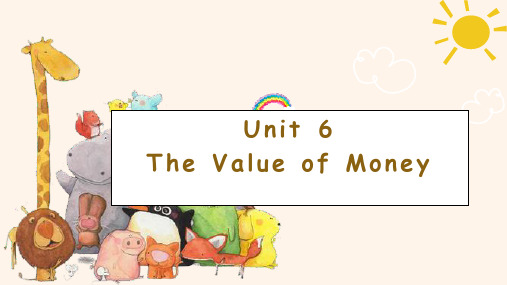
difbufsefraeren车t费ways. Some give a lump opfockseut衣m袋a子t the beginning of a
Phrases and Expressions
on a daily basis每日地 result in导致 pay off付清,偿清 within one’s means量入为出 stand ... in good stead(需要时)对某人有用,对某人有利
II. Text A Teaching Children to Spend
V. Exercises
A Famous Quote名言 Never spend your money before you have it.
------Thomas Jefferson 钱财未到手,绝不提前花。
------托马斯·杰斐逊
Thomas Jefferson (1743-1826), the third President of the United States and the primary author of the Declaration of Independence.
8. constraint /kənˈstreɪnt/ n.限制,限定,约束 constrain /kənˈstreɪn/ v. 限制,约束;强迫,迫使 9. budget /ˈbʌdʒɪt/ v.谨慎花钱,把...编入预算 10. overindulge /ˌəʊvərɪnˈdʌldʒ/ v.过多地享用(尤指食物或饮料) indulge /ɪnˈdʌldʒ/ v. 沉湎;纵容;满足;参加(尤指违法活动) 11. short-sighted /ˌʃɔːt ˈsaɪtɪd/ adj.目光短浅的,没有远见的
自考英语二(00015)Unit6 TextA教孩子理智地花钱

New words (P214)
1. stationery n. 文具 同音词:stationary(静止的) 2. fare n. 车费;船费;飞机票价 同音词:fair(公平的) 3. lump sum n. 一次总付的钱款 4. recess n. 课间休息 5. allocate v. 拨(给);划(给);分配(给) allocation n. 6. overspend v. 花钱过多;比(预计的)花得多;超支 7. opt v. 选择;挑选 option n. optional adj. 8. constraint n. 限制;限定;约束 9. budget v. 谨慎花钱;把…编入预算 10. overindulge v. 过多地享用(尤指食物或饮料) 11. short-sighted adj. 目光短浅的;没有远见的 12. mentality n. 心态;思想状况;思想方法 13. sibling n. 兄;弟;姐;妹
Have you ever thought about your spending habits?
Text A
Teaching Children to Spend Pocket
Money Wisely
教孩子们理性地使用零花钱
Pre-reading Questions (P213)
❖1. Recall and describe how your parents allocated pocket money to you and how you spent it. 回忆并描述过去你 父母是如何给你分配零花钱,你又是怎么花的。 allocate v. 拨(给);划(给);分配(给)
自考英语二(00015)Unit6 TextB 课文

( N )4. Abundance thinking has negative influence on the way you live.
( Y )5. According to the author, the root of all evil has nothing to do with the money itself.
readily 快捷地,轻而易举地 ▪ Boats are readily available to visitors. ▪ The information is readily accessible on the Internet.
available可获得的,可购买的 ▪ Funds are available to assist teachers who want to
首先,信奉“钱不是从树上长出来的”就是被称作缺乏 规划的一个例子。我们的父母教导我们周围绝不会有 足够的金钱,并且它也不是唾手可得或用之不竭的。 scarcity n.不足;缺乏
the scarcity of employment opportunities
enough... to go around足够分配 ▪ Is there enough ice-cream to go around? ▪ There were never enough textbooks to go around.
(完整版)自考英语二(新版)原文Unit6TheValueofMoney
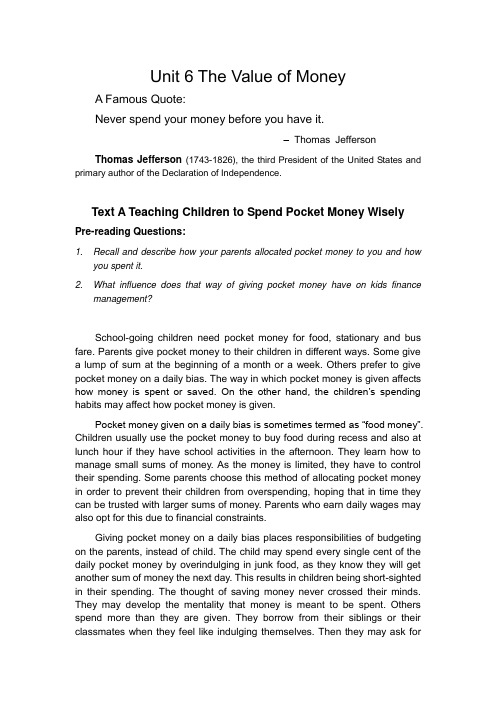
Unit 6 The Value of MoneyA Famous Quote:Never spend your money before you have it.–Thomas JeffersonThomas Jefferson(1743-1826), the third President of the United States and primary author of the Declaration of Independence.Text A Teaching Children to Spend Pocket Money Wisely Pre-reading Questions:1. Recall and describe how your parents allocated pocket money to you and howyou spent it.2. What influence does that way of giving pocket money have on kids financemanagement?School-going children need pocket money for food, stationary and bus fare. Parents give pocket money to their children in different ways. Some give a lump of sum at the beginning of a month or a week. Others prefer to give pocket money on a daily bias. The way in which pocket money is given affects how money is spent or saved. On the other hand, the children’s spending habits may affect how pocket money is given.Pocket money given on a daily bias is sometimes termed as “food money”. Children usually use the pocket money to buy food during recess and also at lunch hour if they have school activities in the afternoon. They learn how to manage small sums of money. As the money is limited, they have to control their spending. Some parents choose this method of allocating pocket money in order to prevent their children from overspending, hoping that in time they can be trusted with larger sums of money. Parents who earn daily wages may also opt for this due to financial constraints.Giving pocket money on a daily bias places responsibilities of budgeting on the parents, instead of child. The child may spend every single cent of the daily pocket money by overindulging in junk food, as they know they will get another sum of money the next day. This results in children being short-sighted in their spending. The thought of saving money never crossed their minds. They may develop the mentality that money is meant to be spent. Others spend more than they are given. They borrow from their siblings or their classmates when they feel like indulging themselves. Then they may ask formoney to pay off their debts. This habit of borrowing causes then to depend on others to solve their problems. In such instances, the purpose of rationing is defeated.Children need to learn how to budget their money. Some parents go by the “learning by doing” principle and give their children lump sums at the beginning of the month, and by the third week of the month their account is already dry.On the other hand, some learn to budget their pocket money very well and even have savings at the end of the month. They do not borrow money necessarily. In other words, they learn to spend within their means. Buy the necessary first, and indulge ourselves only if there is money left. This habit, when inculcated since young, stands them in good stead when they start working and earning their own money. It enables them to resist the temptation of “buy now and pay later” schemes.Formation of any habit starts at a tender age. There is no better way to teach children to manage money than to start with their pocket money. They need to learn the importance of budgeting right from kindergarden days. It is a good idea to start with daily pocket money and move on to monthly pocket money. When children learn to spend within their means, they are able to manage their finances well later in their lives.Text B The Importance of Money in LifePre-reading Questions:1. What do you think of the old saying, “money is the root of evil”?2. Do you believe how people think about money determines whether their moneyflow is constant?What were you taught about money as you were growing up? Something like “money doesn’t grow on trees”, or “money is the root of all evil”, or maybe “all rich people are greedy’?Well, how do you expect to become a success financially if you believe these things? You attract into you life what you are thinking about and what you believe. If you think there is not enough money in this world for everyone you will never have enough money. That is called the Law of Attraction.First o f all, believing that “money doesn’t grow on trees” is an example of what’s called lack or scarcity programming. Our parents taught us that there was never enough money to go around, and that it was not readily available orabundant. But in truth, the universe is very abundant, and there is lots of money as your heart desires. What wonderful thing you could do with it: travel to the countries you have always dreamt of, buy a house you are even scared to think about, attend meditation classes so you could spiritually grow, donate money to your favorite charity, spend more quality time with your family, and the list goes on.The key is to start thinking that you deserve the money and that there is lots of it available for your, and then you can start attracting in into your life. That’s abundance thinking, which is the opposite of lack or scarcity thinking. When you start thinking about abundance the Law of Attraction will do the rest. You do not need to know how it is going to happen. Just make the first step, first thought. Starting is already winning.And what about thinking that “money is the root of all evil”? Can you really expect to become a success if you believe that money is the root of all evil? Unless you have a desire to be an evil person, your subconscious will not let you have money if you believe deep down that it is the root of evil.By the way, the quote is taken out of context in the first place. It was originally stated as “the love of money is the root of all evil”. So it has nothing to do with the money itself.Now that you understand that, you can start to think that money is in fact good. You can help people with money. You can stimulate the economy with money. Even the most kind-hearted spiritual person, who says they don’t need money, can do more to make the world a better place with money than without it.And what about thinking that “all rich people are greedy’? Well, that creates us versus them, whereby you have labeled all of “them” greedy in your mind. You, on the other hand, are very giving in your mind. That’s why you don’t have money, because you’re not greedy.Sure, there must be some rich people in the world who are greedy. But there are also poor people who are greedy. There are both rich and poor people who are very giving as well. The amount of money you have has nothing to do with these character traits.In fact, a lot of rich people got there by not being greedy. Having a giving attitude opens up a flow of money that often brings them more. You will find the same thing: giving away money joyfully to a friend, and notice that it comes back to you in some other form. The world needs to be a balance of give and take, and being joyful both as you give and receive will ensure that you always go with the flow.And changing your mindset from what you were taught as a child to ahealthier view of money will allow you to become the financial success you deserve to be, to become the real you.。
自考英语二(00015)Unit6 TextA 练习

原则上,理论上
Bridging the Gap(P218)
basic grow invest
ideally called
now that wasteful accumulated where direct
将单词分类: 动词:grow invest called accumulated direct 形容词:basic wasteful direct 副词:ideally 连词:now that where
Section A (P219)
1. To obtain objective findings, scientists ___d_r_e_w_t_h_e_____ _c_o_n_c_lu__si_o_n_s_o_n__t_h_e_b_a_s_is__o_f_e_x_p_e_r_im__e_n_t_s_ (根据实验得出 结论).(on the basis of) 2. She is such a self-disciplined person that _sh_e__h_a_s_n_e_v_e_r _b_e_e_n_i_n_d_u_l_g_e_d_i_n__a_lc_o_h_o_l_(她从不沾酒).(indulge in) 3. When he loses his temper, he _is__n_o_t_r_e_sp_o_n__si_b_l_e_f_o_r_h_i_s_ _b_e_h_a_v_i_o_r_s_(对自己的行为不负责任).(be responsible for) 4. The result of being employed proves that m__y__te_a_c_h_i_n_g _e_x_p_e_r_ie_n_c_e__st_a_n_d_s__m_e__in__g_o_o_d_s_t_e_a_d_(我的从教经验对我 利). (stand...in good stead) 5. Figures show that fifty percent of road accidents _h_a_v_e__re_s_u_l_te_d__in__h_e_a_d__in_j_u_r_i_es__(导致头部受伤).(result in)
国考自考英语二Unit 6 课后习题参考答案

Unit 6 课后习题参考答案Text AI . 1. B 2. B 3. D 4. C 5. BII . Section A1 . Differentiate 2. Indulgent 3. Resistance 4. Responsibility 5. Formation 6. unnecessarySection B1 . Constraint 2. Budget 3. Principle 4. scheme 5. Monthly 6. Temptation Section C1.To2. in3. on4. In5. within6. InIII.. 1 . Basic 2. Invest 3. Direct 4. Ideally 5. Called 6. wasteful 7. where8. Now that 9. Accumulated 10. growIV. Section A1. arrived at/reached/drew the conclusions on the basis of experiments2. she has never been indulged in alcohol3. is not responsible for his behaviors4. my teaching experience stands me in good stead5. have resulted in head injuriesSection B不管是否允许孩子们自己管理零花钱,父母和继父母都要预算出一部分现金,满足孩子日常的各种需求。
孩子们不需要太多的零花钱,但是理想的情况是,他们要有足够的零花钱,这样就能学会花钱和攒钱了。
好多家长帮助孩子明白钱的重要性,要求他们把钱分成了至少三份。
第一份是手头要花的钱,第二份是短期储蓄(用来旅游、玩游戏等等),第三份是长期储蓄(用来买车、上大学等等)。
山东省自考英语二Unit6

Unit 6(山东省自考英语)Text AThe British Educational System 英国的教育体系All over the world,the mention of English education suggests a picture of“public schools”,and it suggests in particular the names of certain very famous instructions—Eton,Oxford and Cambridge; but People do not always realize what place these institutions occupy in the who1e educational system.一提起英国教育呈现在人们面前的往往是一幅“公学”的画面,特别是一些著名的教育机构——伊顿、牛津、剑桥等;但是人们往往不了解这些机构在英国整个教育体系中所占的位置。
Oxford and Cambridge are universities each haying about 12,000 students out of a total of over 250,000 students at all British universities.牛津和剑桥两所大学分别拥有大约12 000在校生,而全英在校大学生的总数超过250 000。
Eton is a public school,and the best known of the public schools. which,in spite of their name,are not really public at all,but independent and private secondary schools taking boys from the age thirteen to eighteen years.伊顿是所公学,也是最著名的公学, 尽管名字叫公学,其实并不是真正意义上的公立学校,而是所独立的私立中学。
英语(二)自学教程 Unit 6 Text A-Teaching CHildren to Spend Pocket Money Wisely
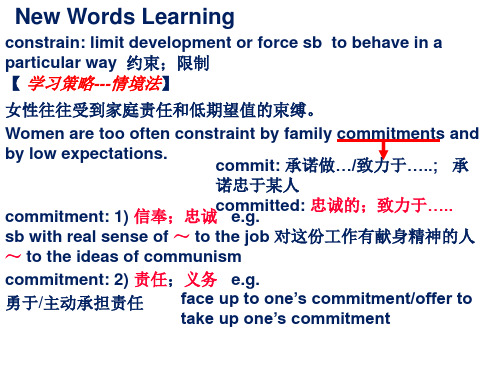
语法
New Words Learning
commitment: 3) 承诺
语法
他们承诺继续合作 They made a commitment to keep working together.
承诺打击恐怖主义和极端主义 make a commitment to fight terrorism and extremism
~+ n. ~sb from…. 抑制 ~ sth that is growing or increasing means to ~ it from getting too large ~ corruption/inflation
indulge: 1) have too much of sth nice, esp food or drink (使自 己)沉迷;放纵(自己) ~ (in) …. ~ one’s passion for football 释放对足球的激情 ~ in shopping 大肆购物 纵情于吃喝 ~ in eating and drinking
commit to fighting terrorism and extremism 【 学习策略---词缀法】 constraint: n. 限制;束缚
水资源匮乏将是制约该地区发展的一个主要因素 Lack of water in this area will be the main constraint on development. contraint: n. control over the way you do what you want to do 约束
overindulge: 过于沉溺于…..;(通常指)过多吃/喝 ~ in alcohol 纵酒
Whenever he is low in mood, she ~ in spending money on clothes and make-up. 一旦情绪不好,她就大肆购买衣服和化妆品。 short-sighted: adj 目光短浅的 【 记忆策略---反义词法】 【 补充】 far-sighted
自考英语2第六单元

7. As an example, a robot doing spot welding one month can be reprogrammed and switched to spray painting the next. Automatic machines, on the other hand, are not capable of many different uses; they are built to perform only one task.
increasingly: adv.不断增加地,日益增长地 increasing: adj. 不断增加的 increase: v.增加 a. Drinking and smoking among young people have increasedto an alarming extent. b. The truth is becoming increasingly apparent. c. The increasing friendship between the two countries strengthen the cultural exchanges between them.
译:例如,一台机器人在做电焊工作一个月后, 可以重新编程,转成下个月做喷漆工作。而自动 化机器却不能有多种不同的用途;它们只能用来 完成一项任务。
switch: n &v. n.1.开关,转化器;2.(思路、话题等)转换 It is a two-way switch. He has made a switch of support from one political party to another. V. 1.转换,改变(思路,话题等) 2. 接通…电流(on), 切断…电流(off) We switched the discussion to another topic. He switched to medicine and graduated in 1980. Entering the room, he switched the light on.
自考英语(二)课文(第六单元)

Unit 7T ext AFamilies“Family”_ the word has different meanings f or different people, and even the di ctionary gives us sev eral definitions: “a group of people related by blood or marriage,’’“two adults and their children,’’“ all those people descended f rom a common ancestor,’’“ a household,’’ and so on. Some people think of a family as a mother, a father, and their children; others include grandparents, aunts, uncles, and cousins. For some of us, family means the group of relatives living far away from home. For others, having a family simply means having children. Some f amilies have long histories, while others know very little about their ancestors. No matter if it is young or old, large or small, traditional or modern, every f amily has a sense of what a f amily is. It is that f eeling of belonging, of love and security that comes f rom living together, helping and sharing.There are basically two types of families: nuclear families and extended f amilies. The nuclear family usually consists of two parents (mother and f ather) and thei r children. The mother and f ather f orm the nucleus, or cent er, of the nuclear family. The children stay in the nuclear f amily until they grow up and marry. Then they f orm new nuclear families.The extended f amily is very large. There are of t en many nuclear families in one extended f amily. An extended f amily includes children, parents, grand-parents, uncles, aunts, and cousins. The members of an extended f amily are related by blood (grandparents, parents, children, brothers, sisters, etc.) or by marriage (husbands, wives, mothers-in-law, etc.). They are all related, so the members of an extended f amily are called relatives.Traditionally, all the members of an extended family lived in the same area. However, with the change from an agricultural to an industrial society, many nuclear families moved away from the f amily home in order to f ind work. In industrial societies today, the members of most nuclear families live together, but most extended f amilies do not live together. Theref ore we can say that the nuclear family becomes more important than the extended f amily as the society industrializ es: In post-industrial societies like the United States, even the nuclear f amily is changing. The nuclear family is becoming smaller as parents want f ewer children, and the number of childless families is increasing. Traditionally, the f ather of a nucl ear family earned money f or the family while the mother cared for house and the children. Today, more than 50% of the nuclear f amilies in the United States are two-earner families_ both the f ather and the mother earn money f or the f amily_ and in a f ew families the mother earns the money while the f ather takes care of the house and the children. Many nuclear f amilies are also “splitting up’’ _ more and more parents are getting divorced.What will be the result of this “ splitting”of the nuclear f amily? Social scientists now talk of two new f amily f orms: the single parent f amily and the remarried f amil y. Almost 20% of all American f amilies are single parent f amilies, and in 85% of these f amilies the single parent is the mother.Most single parents f ind it very dif f i cult to take care of a f amily alone, so they soon marry again and f orm remarried f amilies. As social scientists study these two new f amily f orms, they will be able to tell us more about the f uture of the nuclear family in the post-industrial age. (565 words) (3) (23)T ext BThe Changing American FamilyThe f amily is important to people all over the world although the structure of the family is quite different from one count ry to another. In the United States, as in many countries in the world, the f amily is changing. A generation or two ago, the traditional f amily, in which the f ather was boss, was customary. Now the modern f amily, in which both the f ather and the mother are equal partners, is more common. Although there are several similarities between the traditional and the modern f amily, there are also some very important diff erences.The traditional f amily of yesterday and the modern f amily of today have several similarities. The traditional f amily was a nuclear f amily, and the modern f amily is, too. The role of the father in the traditional f amily was to provide f or his f amily. Similarly, the f ather in the modern family is expected to do so, also. The mother in the traditional family took care of the children’s physical and emotional needs just as the modern mother does.On the other hand, there are some great diff erences between the traditional f amily and the modern f amily. The f irst important dif ference is in the man’s role. The traditional husband was the head of the household, because he was the only one who worked outside the home. If the wi f e worked f or pay, then the husband was not considered to be a good provider. In many f amilies today, both husband and wif e work f or pay. Theref ore, they share the role of head of household. In addition, the traditional husband usually made the big decisions about spending money. However, the modern husband shares these decisions with his working wi fe. Also, the traditional husband did not help his wif e with the housework or m eal preparation. Dinner was ready when he cam e home. In contrast, the modern husband helps his working wife at home. He may do some of the household jobs, and it is not unusual f or him to cook.The second diff erence is in the woman’s role. In the traditional f amily, the woman may have worked f or pay during her f irst years of marriage. However, af ter she becam e pregnant, she would usually give up her job. Her primary role was to take care of her family and home. In contrast, in many f amilies today, the modern woman works outside the home even af ter she has children. She’s doing two jobs instead of one, so she is busier than the traditional mother was. The traditional wif e learned to live within her husband’s income. On the other hand, the modern wif e does not have to because the f amily has two incomes.The f inal difference is in the role of the children. In the traditional f amily, the children were taken care of by the mother because she did not work outside the home. However, today preschool children may go to a child care center or to a baby-sitter regularly because the mother works. The school-age children of a traditional f amily were more dependent. Their mother was there to help them to get ready f or school and to make their breakfast. In contrast, modern children are more independent. They have to get up early in the morning and get ready f or school. Their mother is busy getting ready f or work, so they may even have to make their own breakfast.In conclusion, the American family of today is diff erent f rom the f amily of f i f ty years ago. In the modern f amily, the roles of the f ather, mother, and children have changed as more and more women work outside the home. The next century may bring more important changes to the American f amily structure. In should be interesting to see.(614 words) (6)(17)。
自考英语二教材课文讲义unit6

Unit 6 The Value of MoneyI. New words and expressions New words1. stationery n.文具同音词:stationary2.fare n. 车资;船费;飞机票价3.lump sum n. 一次总付的钱款4.recess n. 课间歇息,5.allocate v. 拨(给);划(给);分派(给)6.overspendv. 花费过多;比(估计的)花得多;超支注意 over- / out-的差别:overeat outeatoverdo outdooversleep outliveoverweight outshine7.opt v. 选择;精选optionoptional8.constraint n. 限制;限制;拘束9.budget v. 慎重花费;把?编入估算10. overindulge v.过多地享受(尤指食品或饮料)11. short-sighted adj.眼光溜浅的;没有远见的12.mentality n. 心态;思想状况;思想方法13.sibling n. 兄;弟;姐;妹14. indulge v. 沉沦,沉浸,沉迷(于?)15.rationing n. 定量配给政策;配给制16.principle n. 观点;(行动、思想的)原因,信条同音词: principal17. unnecessarily adv.没必需地18. differentiate v.划分;差别;鉴别differdifferentdifference19.inculcate v. 频频灌注;谆谆教诲20.resist v. 忍住;抵抗resistance resistant21. temptationn.引诱;迷惑22.scheme n. 计划;方案;系统;系统23.formation n. 构成;形成24. kindergarten n.少儿园25. monthly adj.按月结算的;有效期为一个月的dailyweeklybiweeklymonthlyquarterlyyearlyPhrases and Expressions1. on a daily basis每天地2. result in致使3. pay off付清;偿清4. within one's means量力而行5. stand ? in good stead (需要时)对某人实用,对某人有益II. Text Learning Teaching Children to Spend Pocket MoneyWisely① School-going children need pocket money for food,stationery and bus fares. Parents give pocket money to their children in different ways . Some give a lump sum at the beginning of a month or a week. Others prefer to give pocket money on adaily basis. (1)The way in which pocket money is given affects how money is spent orsaved. (承前启后的句子)On the other hand, the children'sspend ing habitsmay affect how pocket money is given .②(2) Pocket money given on a daily basis is sometimes termed as "foodmoney".Children usually use the pocket money to buy food during recess and also at lunch hour if they have school activities in the afternoon. They learn how tomanage small sums of money. As the money is limited, they have to control theirspending. (承前启后的句子)(3) Some parents choose this method of allocating pocket money in order to prevent their children from overspending , hoping that in time theycan be trusted with larger sums of money.Parents who earn daily wages may also opt for this due to financial constraints.(承上句)本部分要点及难点:1. The way in which pocket money is given affects how money is spent or saved.(1) the way (in which / that) sb. does sth.(参照 Unit 2, Text A)the way (in which / that) sth. is done(2)句子的骨干是: The way affects how money is spent or saved.2.Pocket money given on a daily basis is sometimes termed as"food money".(1) given on a daily basis过去分词短语作定语(2) be termed as被称为?3.Some parents choose this method of allocating pocket money in orderto prevent their children from overspending, hoping that in time they can be trusted with larger sums of money.(1)句子的骨干是Some parents choose this method in order to prevent theirchildren from overspending.prevent sb. from doing sth.与keep sb. from doing sth.同样,但前者from能够省略,后者不可以省略。
自学英语二第六单元作文
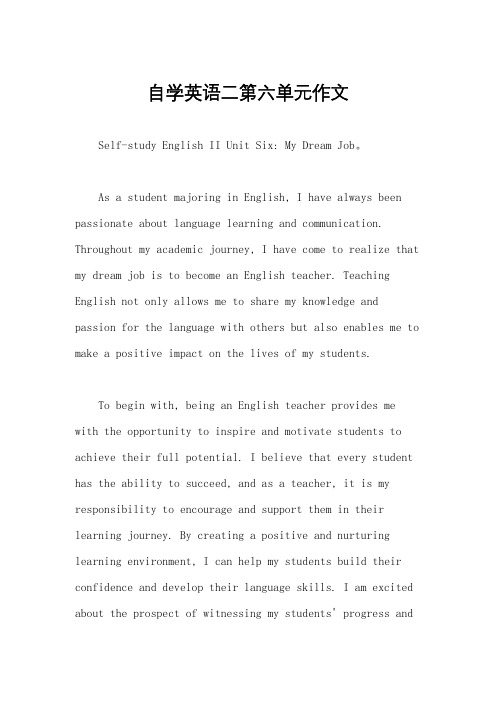
自学英语二第六单元作文Self-study English II Unit Six: My Dream Job。
As a student majoring in English, I have always been passionate about language learning and communication. Throughout my academic journey, I have come to realize that my dream job is to become an English teacher. Teaching English not only allows me to share my knowledge and passion for the language with others but also enables me to make a positive impact on the lives of my students.To begin with, being an English teacher provides me with the opportunity to inspire and motivate students to achieve their full potential. I believe that every student has the ability to succeed, and as a teacher, it is my responsibility to encourage and support them in their learning journey. By creating a positive and nurturing learning environment, I can help my students build their confidence and develop their language skills. I am excited about the prospect of witnessing my students' progress andgrowth as they become more proficient in English.Moreover, teaching English allows me to foster cultural exchange and understanding among students from diverse backgrounds. Language is not just a means of communication but also a window into different cultures and ways of thinking. By exposing my students to various aspects of English-speaking cultures, I can broaden their horizons and help them appreciate the richness and diversity of the world. Through activities such as discussions, debates, and presentations, I can encourage my students to explore different perspectives and develop their critical thinking skills.Furthermore, as an English teacher, I can contribute to the overall academic and personal development of my students. By providing them with a solid foundation in English language and literature, I can help them succeed in their academic pursuits and prepare them for future career opportunities. Additionally, I can serve as a mentor and role model for my students, guiding them in their personal growth and helping them navigate the challenges ofadolescence. I am committed to creating a supportive and inclusive learning environment where all students feel valued and respected.In conclusion, my dream job as an English teacher is driven by my passion for language learning, my desire to inspire and motivate students, and my commitment to fostering cultural exchange and understanding. I believe that teaching English is not just a profession but a calling, and I am excited about the opportunity to make a positive impact on the lives of my students. I am confident that with dedication, hard work, and a genuine love for teaching, I can fulfill my dream of becoming an English teacher and help shape the future generation of global citizens.。
自考英语(二)Unit 6 The value of Money

Key sentences
2. Pocket money given on a daily basis is sometimes termed as "food money". (1) given on a daily basis 过去分词短语作定语 (2) be termed as 被称为…
Key sentences
•opt v. 选择;挑选 ➢More students are opting for English nowadays. •Option n. [计] 选项;选择权;买卖的特权
Students have the option of studying abroad in their second year.
➢With all of our responsibilities fun seems like an indulgence.
principle n. 观念;原则,信条. 同音词:principal 主要的
unnecessarily adv. 没必要地 I think that is
UNIT6:THE VALUE OF MONEY
Text A Teaching Children to Spend Pocket Money Wisely
- 1、下载文档前请自行甄别文档内容的完整性,平台不提供额外的编辑、内容补充、找答案等附加服务。
- 2、"仅部分预览"的文档,不可在线预览部分如存在完整性等问题,可反馈申请退款(可完整预览的文档不适用该条件!)。
- 3、如文档侵犯您的权益,请联系客服反馈,我们会尽快为您处理(人工客服工作时间:9:00-18:30)。
increasingly: adv.不断增加地,日益增长地 increasing: adj. 不断增加的 increase: v.增加 a. Drinking and smoking among young people have increasedto an alarming extent. b. The truth is becoming increasingly apparent. c. The increasing friendship between the two countries strengthen the cultural exchanges between them.
radioactive: adj.放射性的,有辐射的 radioactivity: n. 放射性 radio- : 无线电的,无线电广播的; 放射的,辐射的 radio-controlled 无线电控制的 radiotherapy 放射性疗法 personnel: n. 全体人员,职员 pl skilled personnel personal: adj.个人的 personally adv. personality n.性格,个性
complete/ completion/ completely a. He completely denied the existence of God. b. He has never completed a project on time. c. Money will be paid half in advance and half on completion .
译:例如,一台机器人在做电焊工作一个月后, 可以重新编程,转成下个月做喷漆工作。而自动 化机器却不能有多种不同的用途;它们只能用来 完成一项任务。
switch: n &v. n.1.开关,转化器;2.(思路、话题等)转换 It is a two-way switch. He has made a switch of support from one political party to another. V. 1.转换,改变(思路,话题等) 2. 接通…电流(on), 切断…电流(off) We switched the discussion to another topic. He switched to medicine and graduated in 1980. Entering the room, he switched the light on.
6. Robots differ from automatic machines in that after completion of one specific task, they can be reprogrammed by a computer to do another one. 译:机器人与自动化不同之处在于机器人 完成某一具体任务后,可由计算机重新编 程去完成另一项任务。 in that: 在于,原因是…, 因为… I like the county better in that it is closer to nature.
4. Robots, already taking over human tasks in the automotive field, are beginning to be seen, although to a lesser degree, in other industries as well. There they build electric motors, small appliances, pocket calculators, and even watches.
take over: 接管,接手,接任 CBS Records was taken over by Sony.
spray: n & v n. 水花,浪花;喷雾,喷雾状物 The spray of the waterfall is very beautiful. A spray of bullets hit the tree behind which he was hiding. v. 喷,向…喷 Fruit trees are sprayed regularly. 练习:把漆喷在桌子上。 Spray the paint on the table.
1. Robots, becoming increasingly prevalent in factories and industrial plants throughout the developed world, are programmed and engineered to perform industrial tasks without human intervention. 译:机器人在各个发达国家的工厂和工业 设备中日益普遍;通过编程和设计,机器 人可以在无人介入的情况下完成工业生产 任务。
7. As an example, a robot doing spot welding one month can be reprogrammed and switched to spray painting the next. Automatic machines, on the other hand, are not capable of many different uses; they are built to perform only one task.
completion: n. 完成,结束,圆满 the completion of the new hospital building Satisfactory completion of the course does not ensure you a job. complete: adj. 完全的,彻底的completeness & v. 完成,结束 completion completely: adv. (exercise)
3. They also load and unload hot, heavy metal forms used in machines casting automobile and truck frames.
译:机器人还可用来装卸 铸造汽车和卡车框 架的机器上使用的炽热、笨重的金属铸模。
cast: v & n v. 1.投,仍,抛(at) throw… at 2. 投射(光,影,视线等)(on,at) 3. 浇铸,铸造 The boy cast a stone at the dog. His words cast a new light on the problem. The robot can cast steel after being reprogrammed. n. 1.投,掷;2.模具;3. 演员(阵容)
expose: v. 1.使暴露,使面临 to 2.揭发,揭露 The works were exposed to all kinds of weather. We should be aware of the dangers of exposing children to violence on TV. The mistakes of the past must be exposed without any reserve.
efficiency/ efficient/ efficiently He has done much to increase the efficiency of English teaching in this country. She is very efficient in reducing waste. The farming methods have been efficiently improved with the invention of the new machine.
Unit 6 Improving Industrial Efficiency through Robotics
efficiency: n.效率,功效,功率 efficient: adj. 效率高的,有能力的 the efficient use of energy 能源的有效利用 efficiently: adv. a very efficiently organized event组织效率极 高的活动 (exercise) robotics:机器人学;机器人技术 robot:机器人;自动化控制装置
练习: 1.在过去的三年里,他从一个职业转向另一个 职业。 2.对那个问题进行考虑后,他们把注意力转移 到别的事情上去了。 In the past three years, he has switched from one profession to another. Having considered that problem, they switched their attention to other matters.
automotive: adj. 汽车的,机动车的 automotive industry 汽车工业 auto: n.汽车 auto-:自己的,本身的 automobile 汽车 automatic adj.自动的 automate v.使自动化 automation n.自动化 Automation meant the loss of many factory workers.
译:除了已经在汽车生产领域替代人工劳动外, 机器人也开始见于其他工业部门,虽然使用的程度 要低一些。在那里机器人制造电机、小型器械、袖 珍计算机甚至钟表。 calculator: n.计算器 calculate: v. 计算 calculation n.
4. The robots used in nuclear power plants handle the radioactive materials, preventing human personnel from being exposed to radiation. 译:在核电站使用的机器人处理放射性材料, 从而防止人员受到辐射。
